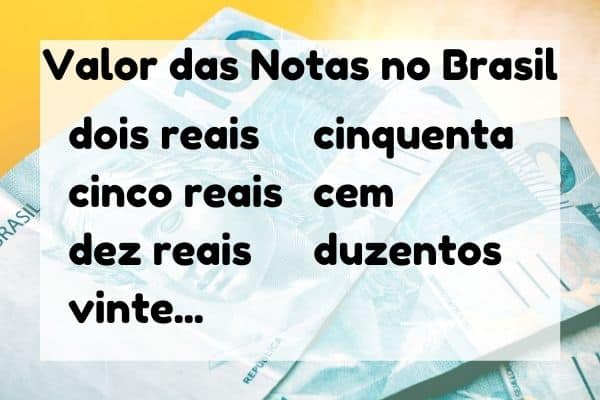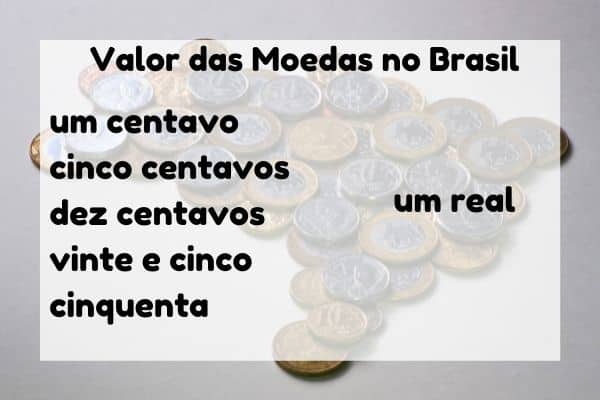Talking about Money in Portuguese like a Brazilian

I like stuff.
I like buying stuff, I like using new stuff, I like consuming stuff.
I don’t talk about this consumerist side of mine to anybody but you, friend.
And if you’re here, chances are you are somehow like me.
After all, you want to talk about money in Portuguese.
Why, may I know?
Perhaps you want to find the nearest ATM and you are in Brazil for a season or two.
Or maybe someone asked you something about money and you didn’t know how to reply because you didn’t understand it in the first place.
Whatever the case is, I’ve got you covered.
Well, I think so.
Because in this article you’re going to discover how to talk about money in Brazilian Portuguese.
And because you’re a good Portuguese learner (you’re here, after all), you’re entitled to a bonus — slangy expressions involving money in Portuguese that you would learn only if you were physically in Brazil.
(Or perhaps talking to friends every day over Skype!)
The Funny and Important Verb “Pagar”
Before we move on, just a quick word or two about the verb “pagar”.
If you speak English as a first language, your natural conclusion is that you have to say to pay for something.
But in Portuguese, the most common construction is to pay something.
- Pago a conta. I pay the bill.
Some people might use “POR” to indicate what you’re paying for, but it’s not really necessary.
- Eu pago pela conta. I pay for the bill.
And also, when we use the preposition “POR” it usually takes the sense of “pay for something bad that you have done, as a penalty”.
But whichever you choose to use, don’t use “para”. Unless you mean “pay for someone to do something”.
I paid you to do the job.
First Things First – Essential Phrases about Money in Portuguese
In different situations you are doing different things with money. So, I decided to divide the vocabulary into three main sections that make sense to me.
Of course, I’m including a table for quick reference as well.
When You Pay
It’s common to chit-chat with the cashier when you’re buying stuff. Most of them are nice – some not, but they might be having a rough day, so… — and they’ll be your friend if you use credit cards or come in with smaller value bills.
Don’t ever try to purchase cheap candies with a 100-real bill.
Ever.
| Portuguese | English |
| O troco | The change (money) |
| Miúdo | Pocket change |
| O cheque | Cheque |
| O cartão de crédito / débito | Credit / debit card |
| A bandeira do cartão | The brand of the card |
| O/A caixa | The cashier |
You had better learn the following phrases. When you’re buying stuff, you’ll see how handy they’ll come in.
- Tem troco para dez? Do you have change for ten?
- Vai precisar de troco? We do need change?
- Vai pagar no crédito ou no débito?Are you gonna pay credit or debit?
- Você aceita cheque? Do you accept cheque?
- Quanto custa? Quanto é? How much?
Modes of Paying
Under this heading, you’ll find some relevant vocabulary about payment methods and plans.
| Portuguese | English |
| À vista | In full (either cash or card) |
| Parcelado | In the installment plan |
| O crediário | Installment plan, but here the store offers the credit, not the card company |
| Parcelar | To pay in installments |
| Em uma, duas parcelas | In one, two installments |
| Sem juros | With no interest |
| Com juros | With interest |
You’ll hear the following sentences very, very often.
- Vou pagar à vista. I’m paying in full.
- Parcela em quantas vezes?And how many installments can I pay it?
- Pode parcelar em até três vezes sem juros.You can pay in up to three installments with no interest.
When You Need Money
When you either need to get paid or get money somewhere, you’ll find the relevant words in this section (and if you don’t, please let me know in the comments so I can update).
| Portuguese | English |
| O caixa eletrônico | ATM (usually, we say only “Caixa”) |
| A agência (bancária) | The bank branch |
| Trocar dinheiro | Break a bill |
| Trocado | “broken” money (smaller value bills) |
| Sacar, o saque | Withdraw, the withdrawal |
| Depositar, o depósito | Deposit, the deposit |
| Fazer uma transferência (transferir) | Transfer money (wire) |
And here you’ll find some examples of those words in use.
- Onde fica o caixa eletrônico mais próximo? Where’s the nearest ATM?
- Onde fica a agência do banco Bradesco mais próxima?Where’s the nearest Bradesco bank branch?
- Tem trocado? Do you have it “broken”?
- Eu preciso fazer um saque, estou sem dinheiro vivo.I need to make a withdrawal; I don’t have cash.
- Qual é o número de sua agência e de sua conta corrente para eu fazer a transferência?What’s the number of your branch bank and your checking account so that I can transfer?
The Currency in Brazil Changes… a lot!
Nowadays, Brazilians use real / reais as a currency. It’s not worth much. When I wrote this article in May 2021, the exchange rate was one dollar for five Brazilian reals roughly.
And in time: the separators of money in Portuguese are the opposite of English:
- R$ 10,53 = dez reais e cinquenta e três centavos.
Cem centavos = um real.
Two things you must keep in mind:
When Brazilians talk about money, even though they need to use the plural form of the word real any formal situations they use the singular form for plural numbers.
- Um real, dois real, três real…
Does it mean you need to do the same?
Not really. But if you do that won’t be weird. Just “uneducated”.
Hypothetically (see below, about the 200-real bill), we have bills for the following values:

And coins worth the following:

But the 200 real bill is a recent invention.
We don’t see it much often.
It was invented somehow to fight inflation.
In the next years, we might see other bills being invented.
Cultural Tip
If you have seen the picture above, you noticed that there is an animal printed in which one of the bills.
In informal situations, people refer to the bills according to the animal stamped on it.
Cultural Tip 2
Off-the-cuff I can tell you that we have about ten words to talk about money in Brazilian Portuguese.
- Bufunfa
- Tutu
- Dindim
- Ceda
- Prata
- Pila
- Vintém
- Capim
- Papel
- Grana
- Gaita…
They are highly informal terms and might be regional, too.
Following are some common terms you might hear on the streets all over Brazil.
Pila – usually singular
Eu não vou pagar 20 pila numa porcaria dessa.I am not shelling out twenty bucks on this crap.
Conto – usually singular
Paguei cinco conto nesse relógio. I paid five bucks on this clock.
Bufunfa – for Money in general
Eu quero saber cadê a bufunfa. I want to know where’s the money.
Endinheirado – When someone has a lot of money
O João é endinheirado. Ele pode pagar.John is rich. He can pay.
A Cautionary Tale about Holding on to Money in Brazil
Story time.
Now, friend, join me as I retell one story that happened here in Brazil that shows how money is a fleeting thing in Brazil.
A woman went to visit her mother. Her mother’s house could use some cleaning, and her mother was too old to do it herself.
Then, in the spirit of helping her mother, the woman did it.
And it was so old and full of dust. She had a lot of work to do.
And during her hard work, she found a trunk, a trunk she had never seen before, and decided to open it.
What a surprise!
In it, there was so much money. Much more than she had ever seen in her entire life.
She was elated — her family could finally have a better life. Not that they were living in poverty. Far from it. But a lot of money like that is nothing to ignore.
But…
The total amount of money she found was 1.4 million in local currency.
But it was the currency in 1994. And in Brazil we had about ten currency changes in the last 100 years.
(To curb inflation, you know?)
That amount of money was a fortune in back then. But when it was found it was worth a little more than ninety-six dollars in today’s money.
So much paper!
And just for curiosity’s sake, below you’ll find all the currencies we’ve had in Brazil.
Some of them are important because they became idiomatic expressions.
Slangy Expressions in Portuguese with Money
You’ll hear the following expressions the whole country. And you can start using them right away if they are true to you.
Apertar o cinto
It literally means to fasten the seat belt.
But when we are talking about someone’s financial situation, it means that this person has to fasten the belt because they have no money to buy food.
If you fasten the belt, you reduce the size of your stomach, hence you can eat less and spend less because you don’t have the money anyway.
- Olha, esses mês as contas não estão fechando. Precisamos apertar os cintos para aguentar um mês.Listen, this month we are not making ends meet. We need to fasten the belts to go through one more month.
Estar duro, liso
Be careful with the first word — duro. It means “hard”. It might have some unwanted sexual innuendo. Of course, the sexual connotation is usually in the listener’s mind.
And you can use those words to talk about your situation when you have no money at all.
“Liso” literally means smooth. And that’s how we are when we have nothing — we are as a smooth as an ironing table.
- Eu até queria te ajudar, mas estou duro.I even wanted to help you, but I have no money.
- Nem tente vender nada para a Janete, porque ela vive lisa.Don’t try to sell Janet anything, because she is always broke.
Ganhar uma bolada
Literally, this one means to learn a ball, but the -ADA ending denotes a hit.
So, if you’re hit with a ball it means you earned a lot of money, or you hit the jackpot.
- Quando eu ganhar uma bolada na loteria, não vou mais trabalhar.When I hit the jackpot on the lottery, I’m not gonna work anymore.
Wrapping Up
Of course, this isn’t everything you can say when it comes to talking about money in Brazilian Portuguese. If you are into investing and would like a little challenge, you can listen to our podcast episode on investment.
It’s entirely Portuguese, and it suitable for intermediate level students.
If you have any questions about money — but please, keep in mind that I am a mere teacher… I might not be able to lend you some money, but I certainly can answer your questions. 🙂
And just so you know, if you’re talking about money, you’ll need the numbers 🙂
The PwE Continuing Education Program
At last, a resource to help you understand more of what you hear in Portuguese. This program is the only one to provide you with an in-depth lesson each week without you having to show up! Learn more.




